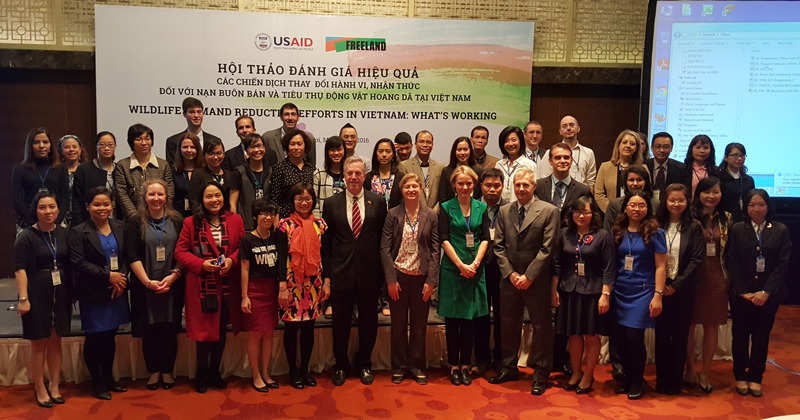Photo derived from Love Frankie
Hanoi, March 30, 2016: Twenty-five Vietnam-based civil society and government organizations convened yesterday in Hanoi and shared lessons learned on what is working and what is not on “behavior change” campaigns aimed at reducing wildlife consumption. Vietnam’s strong appetite for wildlife products and the adverse impact this is having on endangered species such as rhinos, tigers, and pangolins has prompted many NGOs and some government agencies to run campaigns to raise awareness and change behavior to curb this demand. Participants demonstrated that significant efforts have been made over the last 5 years, targeting different audiences and aimed at saving a variety of species.
U.S. Ambassador to Vietnam, H.E. Ted Osius in his opening speech explained “wildlife trafficking will remain a major global threat to species loss, ecosystem degradation, human health and security unless we work collaboratively with stakeholders and as one community. This is what brings us together today.”
This was a vitally important exercise, especially in the wake of a growing demand for wildlife products across the country, whether for pets, exotic food, traditional medicine, trophies, decorations or jewelry. Daniel Lindgren, founder of RapidAsia – a behavioral change evaluation firm, explained how changing someone’s behavior is a journey. The behavioral change journey concept begins with people unaware about something, then they know, believe, change attitude, and pay attention, and finally change behavior.
Participants of the seminar included: U.S. Embassy and South African Embassy representatives, Vietnam’s CITES Management Authority, Biodiversity Conservation Agency, Vietnam Chamber of Commerce and Industry, Ho Chi Minh Communist Youth Union, The People’s Police Academy, Vietnam-based NGOs, Education for Nature-Vietnam (ENV), FHI360, Freeland, GreenViet, PanNature, TRAFFIC, Save Vietnam Wildlife, UNODC, Wildlife at Risk (WAR), Wildlife Conservation Society (WCS), WildAid, and private companies Anh Thuan Media, Love Frankie and RapidAsia. Participants recognized the need for increased collaboration and cooperation, and the importance of linking demand reduction campaigns to enforcement action.
A similar seminar will follow in Beijing in May to assess behavior change progress specific to Chinese consumption of wildlife. Another seminar will be held in Thailand, another consumer country. Each of the behavior change evaluation seminars are funded by The United States Agency for International Development (USAID)’s Asia’s Regional Response to Endangered Species Trafficking (ARREST) Program, and implemented by international counter trafficking organization Freeland. At a time when species are rapidly disappearing from the wild, it is critical that demand reduction work delivers maximum impact in each country that has high levels of wildlife trafficking and consumption.
As two of the world’s foremost markets for rare species products, Vietnam and the United States have contributed significant resources to demand reduction in the region. The USAID ARREST Program has seen significant funds and resources directed towards behavior change when it comes to the consumption of wildlife. This has occurred in tandem with efforts from the US Embassy in Vietnam, such as Operation Game Change – a public-private sector initiative that brings wildlife range and consumer countries together to stop cross-border illegal wildlife trade. This initiative included the outdoor film and music festival WildFest, Vietnam’s largest wildlife conservation awareness-raising event to date.
A proven evaluation framework (KAP Score) was used by Rapid Asia to approximate the extent to which the iThink campaign, featuring key opinion leaders PSAs, has contributed to reducing demand for buying wildlife products in Vietnam. Impact was found to be nearly 5 times more significant amongst past buyers of wildlife products compared to those that had never bought such products in the past. Exposure to the iThink campaign in combination with attending WildFest increased impact by around 40 percent and shows the two activities complimented each other by reinforcing knowledge, attitude and behavioral intentions that are conducive to reducing demand for wildlife products. Proving that combined campaign exposure dramatically speed up the behavior change journey.
Read the full article at FREELAND : REDUCING DEMAND FOR ILLEGAL WILDLIFE IN VIETNAM – TAKING STOCK AND MOVING FORWARD

